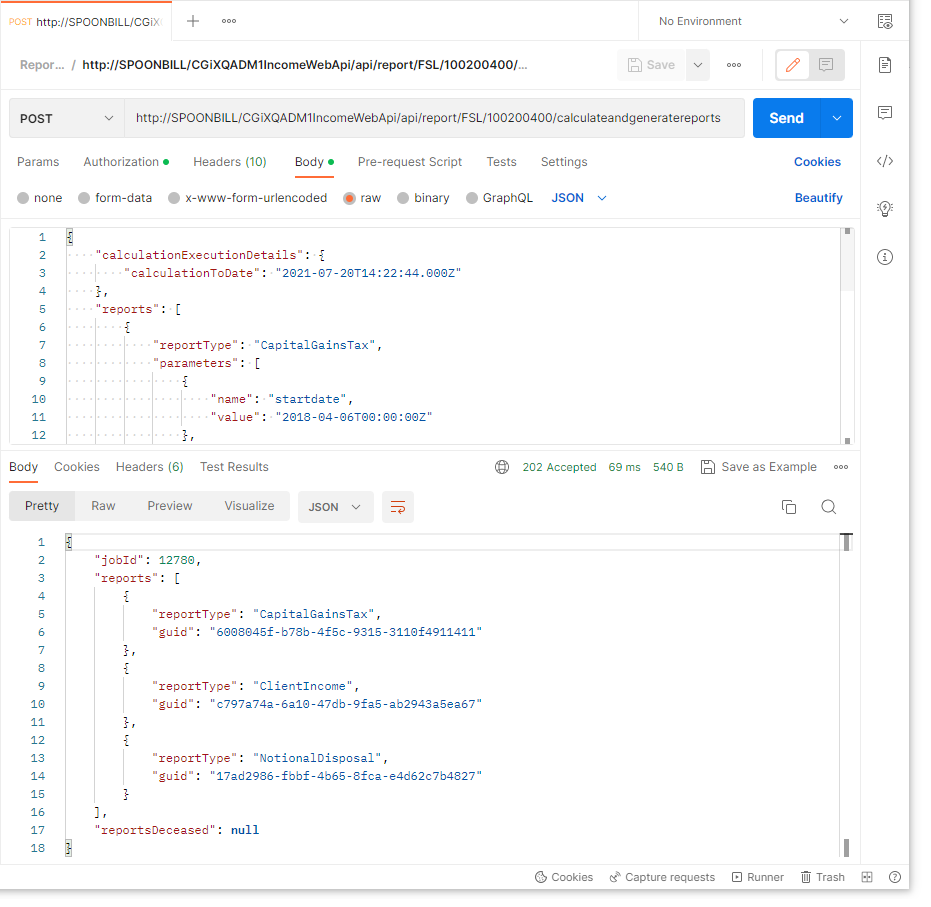Enqueue a Job to Generate Reports
Using the access token obtained, enqueue a report generation job via the Reporting API.
The job will be picked up by the CGiX Hangfire background processing service which will generate the reports based on the input parameters of the API request.
1. Creating the Request
Create a new request in Postman as follows:
- Change the
HTTP verbfrom GET to POST. - Click on the Authorization tab and set the access token as the
Bearer Token.

Authorization tab in Postman
- Specify the
URLto thereport/{companyId}/{clientId}/calculateandgeneratereportsAPI endpoint, where thecompanyIdandclientIdare passed in the URL of the request. For example,<https://fslpresales.fslcgix-uat.co.uk/FSLPresales_WebAPI/api/report/FSL/100200400/calculateandgeneratereports>, wherecompanyId= "FSL" andclientId= "100200400".
URL EncodingThe URL parameters
companyIdandclientIdshould be URL encoded.
- Click on the
Bodytab and then the raw option. - Set the
content typeto JSON; the dropdown is found to the right of the raw option. - Paste in your JSON as the request body. An example is provided below.
{
"calculationExecutionDetails": {
"calculationToDate": "2021-07-20T14:22:00.000Z"
},
"reports":
[
{
"reportType": "CapitalGainsTax",
"parameters": [
{
"name": "startdate",
"value": "2019-04-06T00:00:00.000Z"
},
{
"name": "enddate",
"value": "2020-04-05T00:00:00.000Z"
},
{
"name": "sortbyaccount",
"value": false
}
]
},
{
"reportType": "ClientIncome",
"parameters": [
{
"name": "startdate",
"value": "2019-04-06T00:00:00.000Z"
},
{
"name": "enddate",
"value": "2020-04-05T00:00:00.000Z"
}
]
},
{
"reportType": "NotionalDisposal",
"parameters": [
]
}
]
}The JSON object contains two properties:
| Property Name | Description |
|---|---|
| calculationExecutionDetails | An object that contains a calculationToDate property whose value is a date that is used to update the client’s “Calculate-to-date”. The client is recalculated to this date before the Notional Disposal report is generated. Finally, the “Calculate to-date” is reset by removing this date from the client before triggering the client for recalculation again. |
| reports | An array of objects specifying the reports to generate. |
Each report object has two properties:
| Property Name | Description |
|---|---|
| reportType | Must be one of the following string values: "CapitalGainsTax", "ClientIncome" or "NotionalDisposal". |
| parameters | An array of objects specifying parameter name-value pairs specific to the report type. |
The three report types supported require different parameters as described below:
| Report Type | Parameter Name | Parameter Value |
|---|---|---|
| CapitalGainsTax | startdate | The report tax year start date in ISO 8601 format i.e., "2019-04-06T00:00:00.000Z". |
| enddate | The report tax year end date in ISO 8601 format i.e., "2020-04-05T00:00:00.000Z". | |
| sortbyaccount | Boolean value that orders the report data by account or security. true = Order by account false = Order by security | |
| ClientIncome | startdate | The report tax year start date in ISO 8601 format i.e., "2019-04-06T00:00:00.000Z". |
| enddate | The report tax year end date in ISO 8601 format i.e., "2020-04-05T00:00:00.000Z". |
The NotionalDisposal report type is generated from the client's holding positions. No parameters are required. Specify an empty array for the parameters property.
Report TypesThe
reportsarray must contain at least one report object and duplicate report types are not permitted.
2. Sending the Request
Click the Send button to send the prepared request.

Request and response in Postman
3. The Response Body
When successful, the API response will return the following information in JSON format:
| Property Name | Description |
|---|---|
| jobId | Unique numeric job id for the report generation job. |
| reports | An array of objects specifying the reports being generated. |
| reportsDeceased | When the client is deceased, returns an array of objects specifying the reports being generated for the deceased client. The reports for the probate client are returned via the reports property.When the client is not deceased, reportsDeceased returns null. |
Each report object has two properties:
| Property Name | Description |
|---|---|
| reportType | Will be one of the following string values: "CapitalGainsTax", "ClientIncome" or "NotionalDisposal". |
| guid | Unique string identifier for the report being generated. This is used later on to fetch the generated report. |
Example response:
{
"jobId": 12780,
"reports": [
{
"reportType": "CapitalGainsTax",
"guid": "4ff73e73-8cd1-4ace-96f5-70e44127ff2e"
},
{
"reportType": "ClientIncome",
"guid": "83d53d25-49d1-4c5c-bba9-e1e52bc0b28e"
},
{
"reportType": "NotionalDisposal",
"guid": "a0c1cde7-9979-48d5-bebc-ef3b5a361546"
}
],
"reportsDeceased": null
}Example response when the client is deceased, where the reportsDeceased property is populated:
{
"jobId": 21950,
"reports": [
{
"reportType": "CapitalGainsTax",
"guid": "d73b1354-eb53-4ec1-b822-cf086103340d"
},
{
"reportType": "ClientIncome",
"guid": "5a42a1cf-240b-49e6-9a3c-80236aff6161"
},
{
"reportType": "NotionalDisposal",
"guid": "dc0261ac-8e50-4f73-a256-1dab7d913fe1"
}
],
"reportsDeceased": [
{
"reportType": "CapitalGainsTax",
"guid": "f14a6d51-dfe7-402d-97d8-1c6146406fec"
},
{
"reportType": "ClientIncome",
"guid": "ad98f23c-3d67-4a07-ad07-3ad938565e5d"
},
{
"reportType": "NotionalDisposal",
"guid": "4eb83501-542d-4a01-92b6-5b8430d8172e"
}
]
}Updated 29 days ago
